It looks like you're using an Ad Blocker.
Please white-list or disable AboveTopSecret.com in your ad-blocking tool.
Thank you.
Some features of ATS will be disabled while you continue to use an ad-blocker.
share:
rickymouse
I think the Shuttle program was overall more expensive and was not as reliable as the previous system. There may have been some good reasons for the shuttle but in the long run we would have been better off with the rockets.
Exactly I think a modernised Gemini and a dedicated payload lauch system could have been developed for half the cost.
Another_Nut
reply to post by crazyewok
i believe so
the science we got from it was needed
But could we have gained the same sceince from a cheaper craft? What could the shuttle do that a simpler capsule or dedicated payload launcher couldnt? Except land like a plane!
MystikMushroom
It was a great cover for the military's own space program(s).
The military launches more of its own rockets from places like Vandenberg AFB than NASA ever did/does.
Yes, & let's not forget how many times we were told, especially toward the end of the program, that the Shuttle would be carrying a military satellite, with classified capabilities, into orbit. Not all of the Shuttle's uses were civilian or intended to advance the space program's peaceful intentions.
IMO, we'll never know the full value of the Shuttle program to TPTB, simply because we weren't in the loop about all of its missions.
One way in which it was a major improvement was that the capsule splashdown type of landing was no longer needed. Splashdown had some serious disadvantages, mostly to the astronaut(s) aboard the craft:
The most dangerous aspect is the possibility of the spacecraft flooding and sinking. For example, when the hatch of Gus Grissom's Mercury-Redstone 4 capsule malfunctioned and blew prematurely, the capsule sank and Grissom almost drowned. Despite the fact that water helps cushion the spacecraft's landing to an extent, the impact can still be quite violent for the astronauts. If the capsule comes down far from any recovery forces the crew are exposed to greater danger. As an example, Scott Carpenter in Mercury 7 overshot the assigned landing zone by 400 kilometers (250 mi). These recovery operation mishaps can be mitigated by placing several vessels on standby in several different locations, but this is quite an expensive option.
On a personal note, I was thrilled to see the 1st airplane-style landing of the Shuttle, after seeing canned human beings dropped into the ocean to be fished out, if all went well. It seemed we had finally come of age, & could get on with some serious probes into near space.
Go figure, huh?
edit on 2/4/14 by BuzzCory because: Better choice of words
reply to post by crazyewok
not on the human side
we needed to study people
how to live and work in these conditions
not on the human side
we needed to study people
how to live and work in these conditions
I think this is one of those things that you don't know until you try. the idea of a re-usable vehicle as opposed to the one hit wonder of a rocket
was appealing, and had we not had those two appalling disasters it might even have stayed cost effective.
The cost of the extra safety measures and checks pushed it into the 'too expensive' bracket pretty quickly and that's why it got pulled.
Was it worth it? You can ask if any of it was - the practical benefits of all those telecommunications and TV satellites are debatable, we still get a lot of our weather forecasting data from the conventional methods, and really who needs to know when the Universe started?
To my mind of course it was, for the science and the images alone. Some stuff you have to do because it's there. How can you not marvel at what we can achieve if we put our minds to it, at the view of our home from out there?
Space might be cold, but it's also pretty damned cool.
The cost of the extra safety measures and checks pushed it into the 'too expensive' bracket pretty quickly and that's why it got pulled.
Was it worth it? You can ask if any of it was - the practical benefits of all those telecommunications and TV satellites are debatable, we still get a lot of our weather forecasting data from the conventional methods, and really who needs to know when the Universe started?
To my mind of course it was, for the science and the images alone. Some stuff you have to do because it's there. How can you not marvel at what we can achieve if we put our minds to it, at the view of our home from out there?
Space might be cold, but it's also pretty damned cool.
Another_Nut
reply to post by crazyewok
not on the human side
we needed to study people
how to live and work in these conditions
Which could have been done on a cheaper capsule craft or space station like MIR no?
reply to post by crazyewok
The Space shuttle (and the space station, which may have been able to be built without the shuttle, but perhaps not) have allowed us to learn about how humans can live off-Earth for extended periods of time, and continue to teach us these things -- and I think the knowledge of how humans can live safely off-Earth for extended periods of time is the biggest hurdle that needs to be overcome in manned space exploration, maybe even more so than propulsion systems.
In retrospect, perhaps the ISS could have been built in other/cheaper ways, but the idea of the shuttle was a worthy one worth trying, even if it did not live up to expectations.
The Space shuttle (and the space station, which may have been able to be built without the shuttle, but perhaps not) have allowed us to learn about how humans can live off-Earth for extended periods of time, and continue to teach us these things -- and I think the knowledge of how humans can live safely off-Earth for extended periods of time is the biggest hurdle that needs to be overcome in manned space exploration, maybe even more so than propulsion systems.
In retrospect, perhaps the ISS could have been built in other/cheaper ways, but the idea of the shuttle was a worthy one worth trying, even if it did not live up to expectations.
edit on 2/4/2014 by Soylent Green Is People because: (no reason given)
reply to post by crazyewok
Hi crazyewok,
I remember in the 80s when there was a lot of public focus on the space shuttle I happened to see a picture of Richard Nixon 'inspecting' the space shuttle in what appeared to be a hanger of some sort. I have looked all over for the image so that I could post it here but I can't seem to find the one from my memory.
Anyway, I had by that age a head full of dreams about what our future space program in America might look like, I was deeply interested in science and the imaginings that I held in my mind's eye were pretty ambitious (jet packs, hover cars, action at a distance, interplanetary travel, you know the rap).
Then I saw that picture of Nixon by the space shuttle. The first thing I asked someone that I thought might know was, "How old is that picture?", I was told it was from the early 70's.
I was confused, it was the 80s and I couldn't imagine how it could take over a decade to get the thing up there, I asked why it had sat so long, nobody knew, "Funding", I was told, I think.
Anyway, I knew somehow the whole space program was a crock of # then. Later in the service I learned the term "dog and pony show", that's what the shuttle is: a dog and pony show, and it doesn't end with the shuttle.
I wish I could have not seen that photo, I liked me better when I believed in it all.
Maybe Jim Oberg can explain and make it better,
I don't know,
Hi crazyewok,
I remember in the 80s when there was a lot of public focus on the space shuttle I happened to see a picture of Richard Nixon 'inspecting' the space shuttle in what appeared to be a hanger of some sort. I have looked all over for the image so that I could post it here but I can't seem to find the one from my memory.
Anyway, I had by that age a head full of dreams about what our future space program in America might look like, I was deeply interested in science and the imaginings that I held in my mind's eye were pretty ambitious (jet packs, hover cars, action at a distance, interplanetary travel, you know the rap).
Then I saw that picture of Nixon by the space shuttle. The first thing I asked someone that I thought might know was, "How old is that picture?", I was told it was from the early 70's.
I was confused, it was the 80s and I couldn't imagine how it could take over a decade to get the thing up there, I asked why it had sat so long, nobody knew, "Funding", I was told, I think.
Anyway, I knew somehow the whole space program was a crock of # then. Later in the service I learned the term "dog and pony show", that's what the shuttle is: a dog and pony show, and it doesn't end with the shuttle.
I wish I could have not seen that photo, I liked me better when I believed in it all.
Maybe Jim Oberg can explain and make it better,
I don't know,
edit on 4-2-2014 by Bybyots because: . : .
From 1958-2011 nada had a total budget of $528 million. The military spent more than that last year alone and so did social security.
en.m.wikipedia.org...
NASA sounds like a bargain.
en.m.wikipedia.org...
NASA sounds like a bargain.
Hoosierdaddy71
From 1958-2011 nada had a total budget of $528 million. The military spent more than that last year alone and so did social security.
en.m.wikipedia.org...
NASA sounds like a bargain.
Not saying NASA is not important. Infact I would love for there budget to be expanded to apollo levels.
What I saying is was the shuttle worth its expense or could NASA have gone further?
reply to post by crazyewok
NASA made promises they knew they couldn't keep. I don't remember the story of why they did but I remember they did it. Those shuttles were going to fly once a month! Heads should have rolled somewhere. And I agree with your opinion of nasa. Hitching a ride with the Russians is embarrassing.
NASA made promises they knew they couldn't keep. I don't remember the story of why they did but I remember they did it. Those shuttles were going to fly once a month! Heads should have rolled somewhere. And I agree with your opinion of nasa. Hitching a ride with the Russians is embarrassing.
If the Shuttle Program had been allowed to proceed as originally planned it would have been quite different than what actually did happen. The main
problem was that Congress played volleyball with NASA's budget. NASA couldn't plan because they didn't know how much they would have to spend year
to year.
Hoosierdaddy71
reply to post by crazyewok
NASA made promises they knew they couldn't keep. I don't remember the story of why they did but I remember they did it. Those shuttles were going to fly once a month! Heads should have rolled somewhere. And I agree with your opinion of nasa. Hitching a ride with the Russians is embarrassing.
I believe they expected them to fly every other week at a cost of something like $50 Million per launch. The whole program ended up costing around $200 Billion.
Don't forget that the Soviets tried the shuttle and decided it was a waste of money.
anton74
Hoosierdaddy71
reply to post by crazyewok
NASA made promises they knew they couldn't keep. I don't remember the story of why they did but I remember they did it. Those shuttles were going to fly once a month! Heads should have rolled somewhere. And I agree with your opinion of nasa. Hitching a ride with the Russians is embarrassing.
I believe they expected them to fly every other week at a cost of something like $50 Million per launch. The whole program ended up costing around $200 Billion.
Don't forget that the Soviets tried the shuttle and decided it was a waste of money.
The Soviet Union collapsed in the late 80's and they didn't have the funds to keep it going. So yeah it was a money issue.
NASA knew they were never going to keep that launch schedule. Politics screwed up the whole program.
crazyewok
The aims of the shuttle for NASA was to bring cheap affordable reliable space travel.
But with 2 fatal accidents, a 1kg to LEO that was $10,000 (compared to protons $4000kg to LEO or Soyuz $5000) and a program cost of $209 Billion could the money have been better spent? Would carrying on the Gemini or Apollo craft have been cheaper?
Could we have been on mars by now? Did the 2 catastrophic faluires result in public opinion souring and budgets being cut?
I would say yes to the above and that the shuttle set NASA back 3 decades.
sources on figures:
source
source
The idea of the shuttle, particularly the original designs from the late 1960s/early 1970s which would have seen it take off and land horizontally rather than being strapped to a the back of a rocket almost certainly were some good ones:
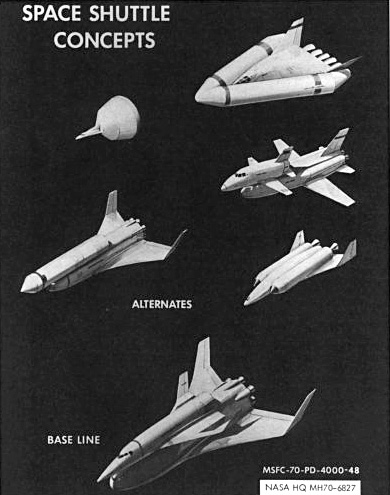
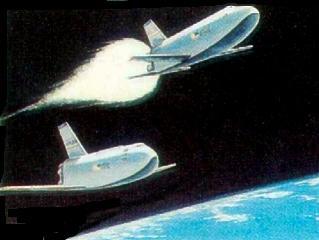
Unfortunately, budget cuts during Nixon's tenure (due to cost of the War in Vietnam coming home) forced the design change to the 'more pragmatic' "glider with rocket engines strapped to a rocket".
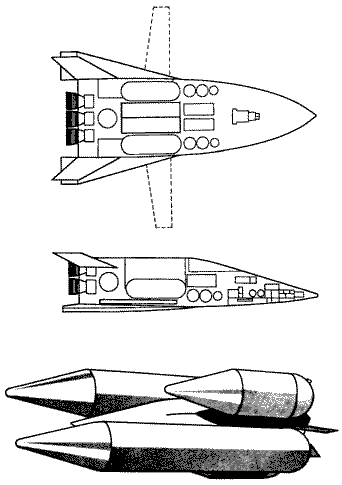
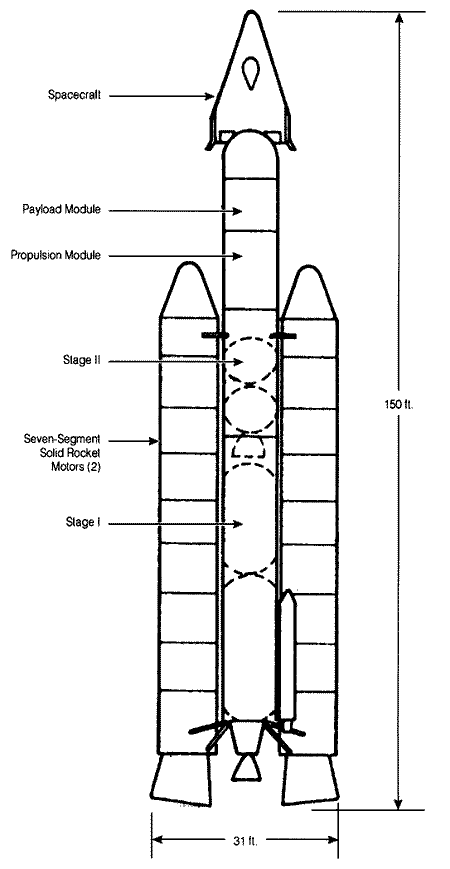
The Challenger accident probably would have not happened had they stuck to the original design. Though the Columbia accident still could have occurred.
Overall the cost of each flight would have been cheaper though since it would have been 100% re-usuable.
I guess in order to really answer the question of the Shuttle program is to ask whether the ISS and Hubble were worth it.
For without the Shuttle or another mostly re-usable vehicle, it's hard seeing a space station as large as the ISS being built, both from a practical and political standpoint.
The Spacelab program (the little lab they used to take up in the Shuttle's Cargo Bay) with the European Space Agency (ESA) fostered good relations between the two agencies paving the way for the Shuttle/Mir program with the Russians and the International Space Station.
And without the Shuttle's ability to do repairs and upgrades on existing satellite's it's hard to imagine the pictures and science we got from Hubble.
Without the repairs and upgrades to Hubble, a lot of money would have been wasted.
The ability to repair things already in orbit was lost. (Well the Air Force has the X-37B but they aren't sharing.)
Not even the Russians, nor Chinese have the ability to make repairs to orbiting assets.
So the Shuttle was a unique vehicle, likely to only be replaced with the Sierra Nevada Corporation's Dream Chaser space plane:
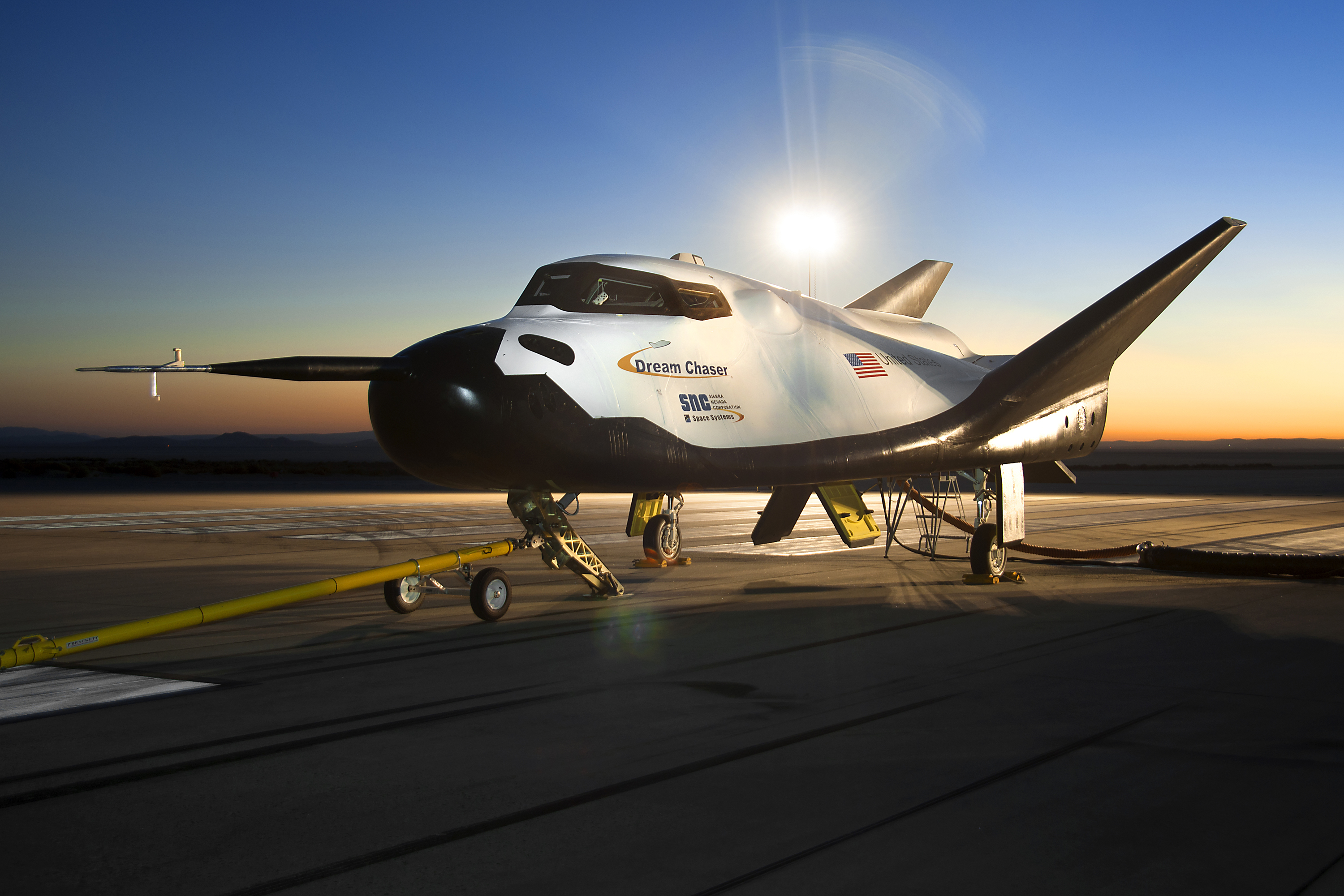
Or with the XCOR Aerospace's Lynx Spaceplane:
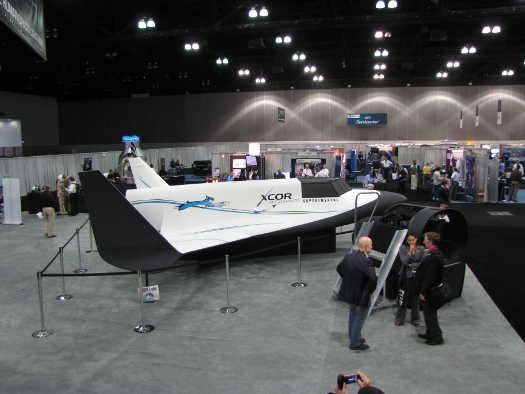
Both of these will see their first flights perhaps later this year or in 2015. However neither has the payload capacity of the NASA Shuttle.
The Shuttle was a good tradeoff of two competing and often conflicting needs: A somewhat reusable, highly maneuverable "Space Ferry" and a large payload vehicle.
Some say the Hubble repair and upgrade missions alone were worth the cost of the Shuttle, for all the science it has given us.
edit on 4-2-2014
by JadeStar because: (no reason given)
crazyewok
rickymouse
I think the Shuttle program was overall more expensive and was not as reliable as the previous system. There may have been some good reasons for the shuttle but in the long run we would have been better off with the rockets.
Exactly I think a modernised Gemini and a dedicated payload lauch system could have been developed for half the cost.
Really don't know much about America do you? Like it said in the movie Contact when it comes to the government why build one when you can build two at twice the cost. Of course the American space program costs more it's because of the private contractors they gouge the prices as much as they can. And the shuttle was worth it because of new tech that was developed and it actually had room to work on objects that were simply to large for the Gemini.
JadeStar
For without the Shuttle or another mostly re-usable vehicle, it's hard seeing a space station as large as the ISS being built, both from a practical and political standpoint.
But MIR was built without a shuttle. surely if the shuttle had not existed another launch vehicle could have been devloped.
JadeStar
The Spacelab program (the little lab they used to take up in the Shuttle's Cargo Bay) with the European Space Agency (ESA) fostered good relations between the two agencies paving the way for the Shuttle/Mir program with the Russians and the International Space Station.
But a Gemini/MIR or Apollo Mir or (insert name)/MIR could have happend aswell the shuttle wasnt vital only the mission and another craft could have done the same.
JadeStar
And without the Shuttle's ability to do repairs and upgrades one existing satellite's it's hard to imagine the pictures and science we got from Hubble.
$200 billion shuttle really worth it just for the 1.5 billion Hubble? Surely if they had gone with a simplier and cheaper option or even stuck with the originial plans like you pointed out the money saved could very well have been used not only to replace the hubble but put a even better telescope up in its place when it broke. $200 billion for just a $1.5 billion peice of equipment just dosnt seem worth it not when billions could have been used to push through better programs for probes and telescopes. We may even have got a kepler a deacde earlier!
JadeStar
Without the repairs and upgrades to Hubble, a lot of money would have been wasted.
Again $200 billion shuttle just for a 1.5 billion telescope. Id rather spend $100 billion on say a simpler manned capsule and dedicated payload launcher. And then just replace the hubble when it broke with the 100 odd billion I would have saved.
JadeStar
Some say the Hubble repair and upgrade missions alone were worth the cost of the Shuttle, for all the science it has given us.
$200+ billion for $1.5 Billion the numbers just dont add up. That nearly 200 hubbles we could of had!
buster2010
[qu And the shuttle was worth it because of new tech that was developed and it actually had room to work on objects that were simply to large for the Gemini.
Not really as there were some advanced design put forward to make it bigger. Plus a small Lab/Space station could have been used.
Plus it could have been another design. As pointed out by jade star the original shuttle designs could very well have worked quite well.
new topics
-
Electrical tricks for saving money
Education and Media: 2 hours ago -
VP's Secret Service agent brawls with other agents at Andrews
Mainstream News: 3 hours ago -
Sunak spinning the sickness figures
Other Current Events: 4 hours ago -
Nearly 70% Of Americans Want Talks To End War In Ukraine
Political Issues: 4 hours ago -
Late Night with the Devil - a really good unusual modern horror film.
Movies: 6 hours ago -
Cats Used as Live Bait to Train Ferocious Pitbulls in Illegal NYC Dogfighting
Social Issues and Civil Unrest: 7 hours ago -
The Good News According to Jesus - Episode 1
Religion, Faith, And Theology: 9 hours ago -
HORRIBLE !! Russian Soldier Drinking Own Urine To Survive In Battle
World War Three: 11 hours ago
top topics
-
Cats Used as Live Bait to Train Ferocious Pitbulls in Illegal NYC Dogfighting
Social Issues and Civil Unrest: 7 hours ago, 8 flags -
Florida man's trip overseas ends in shock over $143,000 T-Mobile phone bill
Social Issues and Civil Unrest: 14 hours ago, 8 flags -
VP's Secret Service agent brawls with other agents at Andrews
Mainstream News: 3 hours ago, 8 flags -
Former Labour minister Frank Field dies aged 81
People: 16 hours ago, 4 flags -
HORRIBLE !! Russian Soldier Drinking Own Urine To Survive In Battle
World War Three: 11 hours ago, 3 flags -
Nearly 70% Of Americans Want Talks To End War In Ukraine
Political Issues: 4 hours ago, 3 flags -
Sunak spinning the sickness figures
Other Current Events: 4 hours ago, 3 flags -
Bobiverse
Fantasy & Science Fiction: 14 hours ago, 3 flags -
Electrical tricks for saving money
Education and Media: 2 hours ago, 3 flags -
Late Night with the Devil - a really good unusual modern horror film.
Movies: 6 hours ago, 2 flags
active topics
-
VP's Secret Service agent brawls with other agents at Andrews
Mainstream News • 29 • : WeMustCare -
Cats Used as Live Bait to Train Ferocious Pitbulls in Illegal NYC Dogfighting
Social Issues and Civil Unrest • 16 • : burritocat -
VirginOfGrand says hello
Introductions • 6 • : TheMichiganSwampBuck -
How ageing is" immune deficiency"
Medical Issues & Conspiracies • 31 • : rickymouse -
Electrical tricks for saving money
Education and Media • 1 • : BeyondKnowledge3 -
Why to avoid TikTok
Education and Media • 18 • : burritocat -
-@TH3WH17ERABB17- -Q- ---TIME TO SHOW THE WORLD--- -Part- --44--
Dissecting Disinformation • 654 • : 777Vader -
Thousands Of Young Ukrainian Men Trying To Flee The Country To Avoid Conscription And The War
Other Current Events • 138 • : Xtrozero -
President BIDEN Vows to Make Americans Pay More Federal Taxes in 2025 - Political Suicide.
2024 Elections • 126 • : DBCowboy -
IDF Intel Chief Resigns Over Hamas attack
Middle East Issues • 44 • : BrotherKinsMan
